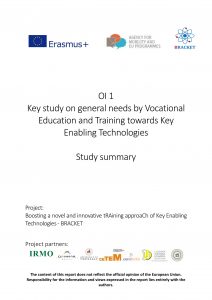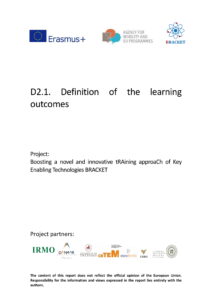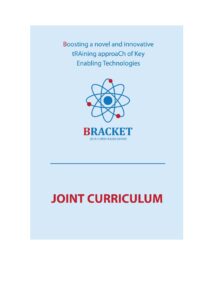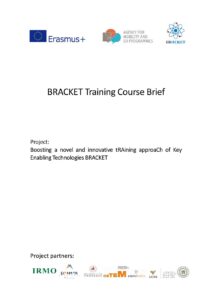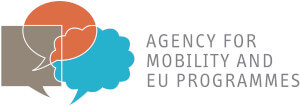6 European countries
7 partners
7 events
6 meetings
Duration: 30 months (01/11/2018 – 30/04/2021)
Project Reference: 2018-1-HR01-KA202-047493
Programme: Erasmus+
Key Action: Cooperation for innovation and the exchange of good practices
Action Type: Strategic Partnerships for vocational education and training
Budget: 271.075,00 EUR
The industry is crucial to Europe’s economy. It contributes to Europeans’ prosperity through business in global and local value chains and also provides jobs. The development of science and technology in recent times is hosting major changes with the emergence of new key concepts, e.g. micro/nano-electronics. In view of above, there is a global race for talent and the European workforce needs to acquire high-level skills needed to continuously improve and boost employability and competitiveness.
The EU industrial policy has defined Key Enabling Technologies (KETs) as a relevant area for scientific innovation. KETs are a basic source for innovation that provides indispensable technological elements for the development of a wide range of new materials, products, and services with great added value. KETs should have substantial impact in terms of creating high quality jobs, improving people’s lives and creating future prosperity, since they could be applied to all sectors and industries: chemicals, textiles, healthcare, etc.
However, one of the major weakness of Europe lies in its inability to translate the knowledge base into specific goods and services. Stakeholders report a gap between the skills that are supplied by educational institutions and the skills that are actually required by the industry. The current educations programmes focus mainly on technical skills, while the professional involved in KETs need to prove their ability to hold a mixture of both technical and non-technical skills.
EU businesses need to become more competitive through talent and innovation. An investment in knowledge, skills and competences will benefit individuals, institutions, organisations and society as a whole by contributing to growth and ensuring equity, prosperity and social inclusion in Europe and beyond.
Consequently, the main objective of this project was to transfer KETs to Vocational Education and Training (VET) through the development of innovative and open learning content in terms of KETs. High capacities cannot be developed and implemented in the markets if students and workers do not have the necessary competences and/or skills, both technical related to chemistry, computer sciences, etc., and non-technical skills as entrepreneurship, innovation, etc.
To this end, the BRACKET Consortium defined the following specific objectives (SO):
SO1. To study and analyse the incoming trends regarding KETs and competences necessaries to foster its implementation and work in VET.
SO2. To design and develop a Joint Curriculum (JCV) for developing and fostering new skills on VET students (initial or continued VET) with the participation of stakeholders, experts and Universities with experience in these enabling technologies as well as in non-technical skills.
SO3. To deliver the JCV on e-learning OER platform and protect it under open licenses.
SO4. To break boundaries among VET students, workers and experts in KETs, creating common procedures and defining skills. It will be developed during the execution of the four Intellectual Outputs.
SO5. To equip VET users and other target users with the right skills and knowledge about KETs from today and tomorrow and to foster a sustainable and innovative development.
SO6. To create new job opportunities for people with the necessary skills in the field of KETs.
BRACKET results have comprised:
– The development of four Intellectual Outputs:
- A Key study on general needs by VET towards Key Enabling Technologies (KETs).
- A Joint Curriculum according to the target groups needs as defined in the previous analysis, having as a basis both the skills and competences required for implement KETs in VET, technical and non-technical skills.
- A Training content based on five different modules, covering all required learning outputs.
- A collaborative platform, where target users will have access to all the developed content and will share experiences among them.
– The arrangement of 6 Transnational meetings. After the outburst of the COVID pandemic IRMO contacted the NA to ask the permission to hold the BRACKET Transnational Project Meetings (3 last ones) online at the times they were planned.
– The arrangement of 7 multiplier events. The same situation occurred with the organisation of multiplier events. Due to COVID pandemic some partners organised them on-line and some organised them according to COVID restrictions, in smaller groups.
However, further intangible results were expected during and after BRACKET implementation:
– BRACKET developed and implemented and innovative practice, a new training curriculum of Key Enabling Technologies, adapted to the future trends and needs of the whole society.
– The reinforcement and review of those key competences and skills needed for Vocational Education and Training towards KETs in order to create new and innovative products, processes and services with greatest added value.
o Entrepreneurship
o Strategy
o Innovation
o System Thinking
o Product design
o Sales and customer value creation
Through pedagogical methods based on the learning outcomes approach, the results obtained were:
– An assessment methodology to facilitate the recognition and validation of these skills and competences.
– The above results will reinforce the education and training paths of the target groups; they are now able to acquire and strengthen all necessary competences and skills to develop those potential activities related to Key Enabling Technologies.
– The promotion of work-based learning through the arrangement of training pilots where representatives of the target groups will be able to implement KET methodologies in real products and service in a contest approach.
– The training program is freely accessed as a MOOC course; it supports target groups in acquiring or improving the use of ICT for learning and related digital competences and its promotion as a driver for systematic change to increase the quality and relevance of VET.
– The multiplier events and all promotional actions planned have helped to widely spread the work done. Sharing outcomes and experiences beyond the partnership has enabled a wider audience to benefit from the work funded by the Erasmus + programme.
O1: Key study on general needs by Vocational Education and Training towards Key Enabling Technologies.
This key study analysed general needs by Vocational Education and Training towards Key Enabling Technologies in six countries – Spain, Greece, Croatia, Latvia, Poland and Slovenia. The report is divided in two parts: the first part analyses the inclusion of KETs in documents at national level and the second part analyses data collected by questionnaire.
All of the countries analysed have well developed institutions in the KETs area, such as universities, faculties, schools, associations, research institutes, etc. Moreover, KETs are largely included in higher education system where the knowledge related to KETs is provided to students. However, there is still a gap in terms of Vocational Education and Training, since there is not enough training content available in terms of KETs. Nevertheless, the inclusion of KETs in general education system in these countries provides a good basis for further development.
The second part of report provides the results of the questionnaire conducted it these six countries in the period from January until end of March 2019 which gathered 140 answers – 35 in Spain, 25 in Greece, 27 in Croatia, 12 in Latvia, 20 in Poland and 21 in Slovenia. The questionnaire was divided in four parts – general skills, nanotechnology, biotechnology and advanced materials and in each part, respondents had to rate the importance and relevance of those skills now and in the future, the degree of skills at the participants’ company or institution and education or training provided by VET, HE and LLL in those fields.
Overall, general skills are found as absolutely essential now and in the future among participants, while the degree of those skills and knowledge provided by VET, HE and LLL programmes are found between moderate and very good. Nanotechnology was rated as very relevant now and absolutely essential in the future, while the nanotechnology related skills and knowledge were overall rated between poor and moderate. Biotechnology was also rated as very relevant now and absolutely essential in the future, the biotechnology related skills in participants’ company or institution as poor or moderate, as well as the education or training provided by VET, HE and LLL programmes. Regarding advanced materials they were rated as very relevant now and absolutely essential in the future. Skills related to advanced materials in participants’ company or institution were rated between moderate and good, while the education or training was rated as between poor and moderate.
O2: BRACKET Joint Curriculum.
The results obtained in the first output of the project were the input for the definition of the Joint Curriculum in the second output of the BRACKET project, the development of the training material that contains information on both general skills and KETs information (about nanotechnology, biotechnology and advanced materials).
Five units were defined with its subsequent subunits:
Unit 1. Introduction to Key Enabling Technologies
Unit 2. Nanotechnology
Unit 3. Biotechnology
Unit 4. Advanced materials
Unit 5. Innovation regarding Key Enabling Technologies
Finally, The Joint Curriculum within the BRACKET Project was validated through a series of questionnaires with stakeholders of the industry sector. Stakeholders and associated partners provided their feedback about it, with the aim to identify the potential weaknesses and areas for improvement.
The survey consisted of 10 questions divided into two parts. The conducted survey was completed by 44 participants – different KET experts, students or VET professionals. The participants were invited to check the general overview of the Joint Curriculum drafted for this task.
The respondents were evaluating different aspects of the ‘Joint Curriculum Harmonized Units’.
First section of the questionnaire was dedicated to the mission of the course and the participants were evaluating:
- Innovation and technology drivers
- Benefits of the course
- Barriers of the course
From all three aspects the “Joint Curriculum Harmonized Units” passed the evaluation very successfully.
O3: BRACKET TRAINING MATERIAL
The partners worked on the development of the content topics of the training modules: lecturing materials, presentations, videos, etc. Tests were also created so that students can assess their knowledge. Once the content was reviewed by all partners, it was time to translate it into the different mother tongues of the Consortium. In addition, it was decided in IO3-A5 which kind of OER license best suited the BRACKET project. It was decided that Creative Commons and more specifically, with the “Attribution 4.0 International (CC BY 4.0) license” was the most suitable for the BRACKET project, as Creative Commons helps everyone to set for the work created right restrictions and the users to get all the rights they need and therefore the BRACKET project respects the Erasmus+ program rules regarding the “non-commercial” use of the materials and can maintain the intellectual property on the produced material while sharing it with the users.
O4: BRACKET TRAINING AND COLLABORATIVE PLATFORM
Parallelly to the development of the training material, the e-learning platform was designed and implemented according to the training path and the learner’s necessities and then, all content was successfully integrated. The e-learning platform guidelines were created as well before verifying the training material and the platform with a pilot test. 59 people participated in the testing, in the end completing questionnaires – 50 of them (85%) belonged to the category students/employees and 9 of them (15%) to the category teachers/managers. Some minor improvements of the content and the platform were done as a result of obtained feedback.
The BRACKET online training is available for free after registration. This training is available in seven different languages: English, Croatian, Spanish, Slovenian, Greek, Polish and Latvian.
Apart from implementing 16 activities leading to the production of four project outputs (each the previous section for details), each partner has been involved in the organisation of a multiplier event in their respective country. Organized either online or face-to-face, the total number of attendants of 7 multiplier events was 120.
In general, all promotional actions planned have helped to widely spread the work done. Sharing outcomes and experiences beyond the partnership has enabled a wider audience to benefit from the work funded by the Erasmus + programme.
